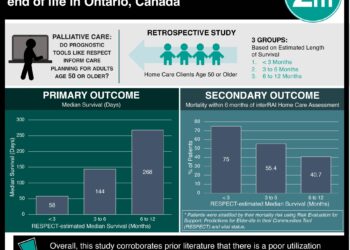Palliative care likely to improve patient quality of life and reduce symptom burden
1. In this meta-analysis of randomized controlled trials, palliative care significantly improved patient quality of life and symptom burden, though bias and heterogeneity cast some doubt onto the overall validity of these findings.
2. A narrative synthesis of outcomes suggested that palliative care improves advanced care planning as well as patient and caregiver satisfaction without reducing lifespan.
Evidence Rating Level: 1 (Excellent)
Study Rundown: Greater emphasis is being placed on end-of-life planning. Physicians are placing more consideration on palliative care for their patients with terminal diseases. However, it still remains unclear exactly which patient quality domains are being impacted by the increased use of palliative care. In this meta-analysis, palliative care was found to improve the overall quality of life and reduce symptom burden significantly. However, large study heterogeneity and bias attenuated these measures somewhat. Narrative synthesis of outcomes suggested that palliative care improved advanced care planning, patient and caregiver satisfaction, and health care utilization efficiency. In addition, no study showed a reduction in lifespan.
The great heterogeneity of trials and high risk of bias is concerning when accepting the results of this meta-analysis. It seems clear that more well-designed trials are necessary to understand palliative care more holistically. In addition, the vast types of palliative care could not be analyzed in this meta-analysis, and so it remains uncertain if all palliative care strategies are equal. Trials evaluating these strategies are of great importance.
Click to read the study in JAMA
Relevant Reading: Dying in America: Improving quality and honoring individual preferences near the end of life
In-Depth [meta-analysis]: In this meta-analysis, 56 trials covering 12,731 patient and 2,479 caregivers were included and evaluated using the Cochrane Handbook for Systematic Reviews of Interventions. Of the total trials, 15 evaluated quality of life at 1 to 3 months, indicating a statistically significant standard mean difference of 0.46 (CI95 0.08 to 0.83; heterogeneity I2 94.8%). Sensitivity analysis restricted to trials with low potential for bias attenuated this finding (SMD 0.18; CI95 0.06 to 0.34; I2 = 0%), and Egger test showed significant publication bias (p = 0.03). Another 10 trials evaluated symptom burden at 1 to 3 months, indicating a statistically significant standard mean difference of -0.66 (CI95 -1.25 to -0.07; I2 = 96.15). However, sensitivity analysis was not significant (SMD -0.21; CI95 -0.42 to 0.00; I2 = 42.1%), though there was no evidence of publication bias. Narrative synthesis of outcomes suggested that palliative care improved advanced care planning, patient and caregiver satisfaction, and health care utilization efficiency. In addition, no study showed a reduction in lifespan.
Image: PD
©2016 2 Minute Medicine, Inc. All rights reserved. No works may be reproduced without expressed written consent from 2 Minute Medicine, Inc. Inquire about licensing here. No article should be construed as medical advice and is not intended as such by the authors or by 2 Minute Medicine, Inc.







